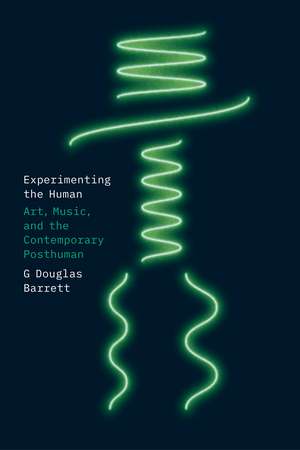Experimenting the Human: Art, Music, and the Contemporary Posthuman
Autor G Douglas Barretten Limba Engleză Paperback – 13 ian 2023
In Experimenting the Human, G Douglas Barrett argues that experimental music speaks to the contemporary posthuman, a condition in which science and technology decenter human agency amid the uneven temporality of postwar global capitalism. Time moves forward for some during this period, while it seems to stand still or even move backward for others. Some say we’re already posthuman, while others endure the extended consequences of never having been considered fully human in the first place. Experimental music reflects on this state, Barrett contends, through its interdisciplinary involvements in postwar science, technology, and art movements.
Rather than pursuing the human's beyond, experimental music addresses the social and technological conditions that support such a pursuit. Barrett locates this tendency of experimentalism throughout its historical entanglements with cybernetics, and in his intimate analysis of Alvin Lucier’s neurofeedback music, Pamela Z’s BodySynth performances, Nam June Paik’s musical robotics, Pauline Oliveros’s experiments with radio astronomy, and work by Laetitia Sonami, Yasunao Tone, and Jerry Hunt. Through a unique meeting of music studies, media theory, and art history, Experimenting the Human provides fresh insights into what it means to be human.
| Toate formatele și edițiile | Preț | Express |
|---|---|---|
| Paperback (1) | 169.38 lei 3-5 săpt. | +13.07 lei 5-11 zile |
| University of Chicago Press – 13 ian 2023 | 169.38 lei 3-5 săpt. | +13.07 lei 5-11 zile |
| Hardback (1) | 582.96 lei 6-8 săpt. | |
| University of Chicago Press – 13 ian 2023 | 582.96 lei 6-8 săpt. |
Preț: 169.38 lei
Nou
Puncte Express: 254
Preț estimativ în valută:
32.42€ • 35.23$ • 27.25£
32.42€ • 35.23$ • 27.25£
Carte disponibilă
Livrare economică 31 martie-14 aprilie
Livrare express 15-21 martie pentru 23.06 lei
Preluare comenzi: 021 569.72.76
Specificații
ISBN-13: 9780226823409
ISBN-10: 0226823407
Pagini: 240
Ilustrații: 4 halftones
Dimensiuni: 152 x 229 x 15 mm
Greutate: 0.34 kg
Ediția:1
Editura: University of Chicago Press
Colecția University of Chicago Press
ISBN-10: 0226823407
Pagini: 240
Ilustrații: 4 halftones
Dimensiuni: 152 x 229 x 15 mm
Greutate: 0.34 kg
Ediția:1
Editura: University of Chicago Press
Colecția University of Chicago Press
Notă biografică
G Douglas Barrett is assistant professor in the Media Arts Department at New Jersey City University.
Cuprins
Introduction: Music in a Wired Brain
1. The Brain at Work: Cognitive Labor, the Posthuman Brain, and Alvin Lucier’s Music for Solo Performer
2. “How We Were Never Posthuman”: Techniques of the Posthuman Body in Pamela Z’s Voci
3. “The Catastrophe of Technology”: Posthuman Automata and Nam June Paik’s Robot K-456
4. Deep (Space) Listening: SETI, Moonbounce, and Pauline Oliveros’s Echoes from the Moon
5. Engendering the Digital: Digitality and the Posthuman Hand in Laetitia Sonami’s Lady’s Glove
6. The Last Invention: Recursion, Recordings, and Yasunao Tone’s AI Deviation
Conclusion: Music after Extinction
Acknowledgments
Notes
Index
1. The Brain at Work: Cognitive Labor, the Posthuman Brain, and Alvin Lucier’s Music for Solo Performer
2. “How We Were Never Posthuman”: Techniques of the Posthuman Body in Pamela Z’s Voci
3. “The Catastrophe of Technology”: Posthuman Automata and Nam June Paik’s Robot K-456
4. Deep (Space) Listening: SETI, Moonbounce, and Pauline Oliveros’s Echoes from the Moon
5. Engendering the Digital: Digitality and the Posthuman Hand in Laetitia Sonami’s Lady’s Glove
6. The Last Invention: Recursion, Recordings, and Yasunao Tone’s AI Deviation
Conclusion: Music after Extinction
Acknowledgments
Notes
Index
Recenzii
"Setting out from cybernetics’ collusion with neoliberal financialization, and probing the increasingly urgent question of the posthuman, Barrett’s compelling book asks ‘how to recompose posthumanism’. Deepening our understanding of experimental music’s journeying in postformalist artistic territories, and infused by critical race, queer, and feminist thinking, Barrett dialogues with the visionary work of six artists who cut through and reconfigure our troubled relations with technology through inventive practices that insistently bring the social and political back in."
"Posing both uncomfortable questions and new possibilities for the understanding of music, Barrett trenchantly turns our attention to how experimental composers have long engaged with the critical issues of our time now being explored in many technological and humanistic fields. These essays ringingly assert the centrality of new musical expression in constituting both the human and the posthuman."
"Experimenting the Human considers how experimental artists like Pamela Z, Nam June Paik, and Pauline Oliveros have critically engaged with the figure of the posthuman in their work. In the process, Barrett not only traces the possibilities of the posthuman disclosed through their artistic practice, but also the limits and blindspots they reveal, particularly given the posthuman's lingering, latent indebtedness to the raced, classed, and gendered exclusions that have long defined the human. Ambitious in scope and virtuosic in execution, Barrett’s book will be of interest not just to music scholars but to critical thinkers of all stripes."
“Experimenting the Human examines an interdisciplinary, intergenerational roster of artists working across music, new media, and visual and performance art and contextualizes their experimental practices within histories and theories of technology and the posthuman from the Enlightenment to the present. Through these artists’ technological augmentation of the brain, hands, ear, and voice, Barrett shows how they have advanced unique modes of indeterminacy that register subjective precarity and difference. Their critical, resistant engagements with technology decenter human agency in ways that help us rethink the human for the past, present, and future, while also reaffirming our common humanity. Experimentalism, Barrett remarkably shows, has always been posthuman.”
"This is a well-written and informed text with extensive historical research that significantly expands and contextualises the various case studies discussed with reference to the others, enhancing the consistency of both the arguments and the subject matter.”
"Barrett's inventive melding of the art historical imaginary and posthuman experimental music has been brought to us, thoughtfully as ever, to marshal and defend the powers of critique, and to listen to this experimental work with the limits of humanism in view."
